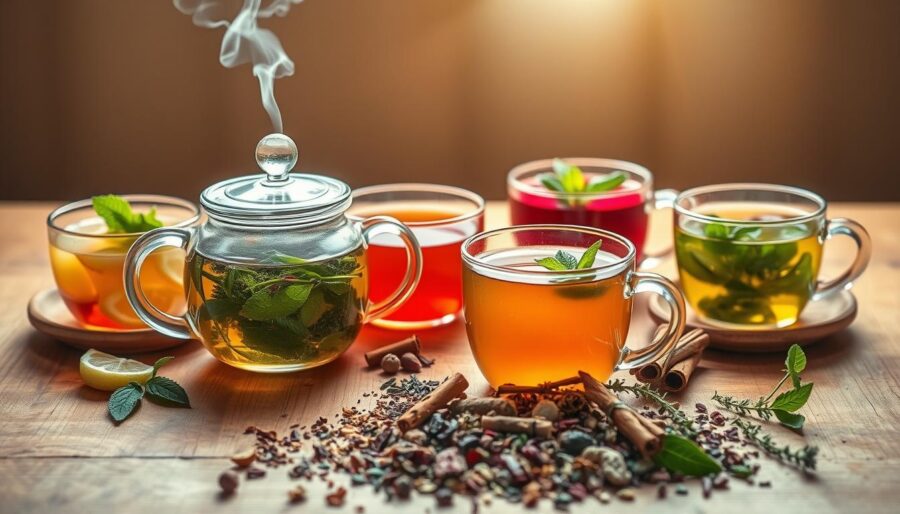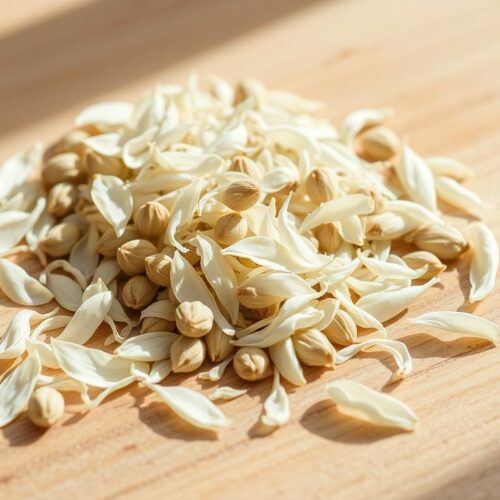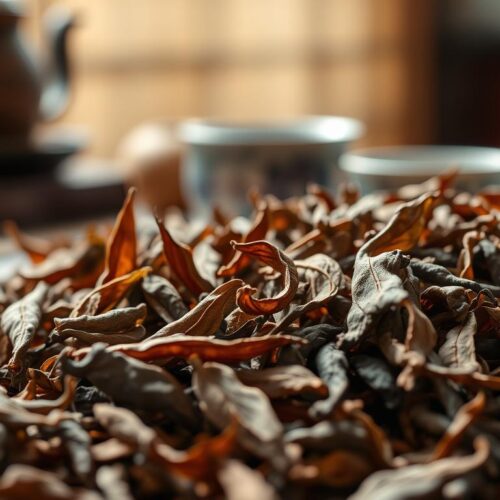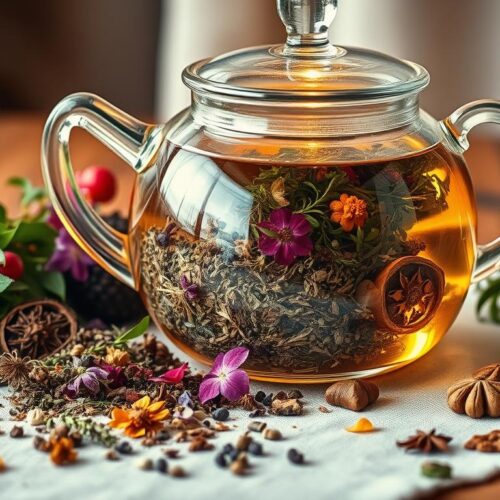Herbal teas, also known as tisanes, have been celebrated for centuries. They come from different parts of plants like leaves and roots. This makes them a great option without caffeine, perfect for many diets. By learning about herbal tea benefits, you can choose wisely for your health daily. Let’s dive into how these teas can improve your health and well-being.
Understanding Herbal Tea: An Introduction
Herbal tea, often called tisane, gives us many flavors and benefits from plants. It’s different from traditional tea because it doesn’t come from the Camellia sinensis plant. This means it’s caffeine-free, so you can enjoy it anytime. You can also make your own blends with fresh herbs, making tea drinking a unique experience.
Ingredients like chamomile, peppermint, and hibiscus are common in herbal teas. Each one offers special benefits, like better digestion, mood boosts, and relaxation. Herbal teas let you try various blends to find what you like best, whether it’s for energizing or calming effects.
Growing your herbs for tea is something many enjoy. It means you know your tea is fresh and top-quality. Making your tea can also spark creativity and help you feel more connected to what you drink.
| Herbal Tea Type | Main Ingredients | Common Benefits |
|---|---|---|
| Chamomile | Chamomile flowers | Soothing, sleep aid |
| Peppermint | Peppermint leaves | Digestive aid, refreshing |
| Hibiscus | Hibiscus petals | Rich in antioxidants, heart health |
| Lemon Balm | Lemon balm leaves | Calming, anxiety relief |
Learning about herbal tea can lead to fun discoveries in your health and wellness journey. Trying different herbal infusions might help you find new favorites. This can be a great addition to your health routine and experiences.
Wellness Benefits of Herbal Tea
Herbal tea offers many health benefits that can make you feel better overall. These drinks boost hydration and provide important antioxidants. They help your body work better. People enjoy benefits like clearer thinking, feeling relaxed, and better digestion from drinking herbal teas.
Herbal teas can help you focus more and feel less stressed. This is thanks to the herbs they contain. Chamomile and peppermint teas have a soothing effect. Ginseng tea can give you energy. Adding these teas to your daily life brings nature’s healing powers into your routine.
Whether you like ginger tea’s zesty taste or lavender’s calming effect, each type has its own health perks. Make herbal tea a regular part of your day. This way, you embrace natural ways to stay healthy.
Herbal Teas for Weight Management
Herbal teas are great for weight management. They naturally support you in leading a healthier life. Some teas can boost your metabolism and reduce your cravings.
Take green tea, for instance. It’s known for making your metabolism faster. Drinking this tea every day can help you manage your weight. Peppermint tea, on the other hand, is good for controlling hunger. It’s also tasty and refreshing any time you drink it.
Adding these teas to a well-balanced diet can really help your efforts. Try mixing different herbal teas to get various benefits. Remember, staying active is key for the best outcomes.
| Herbal Tea | Weight Management Benefits |
|---|---|
| Green Tea | Boosts metabolism and enhances fat oxidation. |
| Peppermint Tea | Helps suppress appetite and reduces cravings. |
| Rooibos Tea | May reduce stress hormones that trigger fat storage. |
| Ginger Tea | Promotes digestion and may help control hunger levels. |
Enhancing Sleep Quality
Many herbal teas are known for their calming effects that help you sleep better. Chamomile tea is a top pick for relaxation and enhancing sleep. This gentle tea is not only delicious but also offers benefits that help you sleep well.
Start a calming bedtime ritual with a warm cup of chamomile tea. This ritual tells your body it’s time to relax, helping you feel peaceful. Chamomile’s soothing effects are well-known, making it perfect for your evening routine.
To make your sleep even better, try these tips with herbal teas each night:
- Gradually reduce screen time before bed to relax your mind.
- Drink your tea in a cozy, quiet place with soft lighting.
- Try other soothing teas like lavender or valerian root along with chamomile.
Let teas like chamomile lead you to the relaxation you need for good sleep. With regular use, you’ll likely see your sleep quality get better.

The Antioxidant Power of Herbal Teas
Herbal teas are loaded with antioxidants. These substances shield your body from oxidative stress. This stress can harm your cells and impact your health. Adding herbal teas to your daily life can help protect you from this damage.
Hibiscus and rooibos teas are famous for their strong antioxidant levels. Drinking these teas can prevent chronic diseases, extend your life, and improve your health.
Including herbal tea in your routine can be very beneficial. It lets you enjoy a tasty drink while fighting off free radicals. Adding these rich, antioxidant teas to your diet is a smart, tasty choice.
Herbal Tea and Mental Clarity
Some herbal teas, like peppermint and ginkgo biloba, help with mental clarity. Peppermint tea is refreshing and boosts focus. It also reduces mental tiredness. Ginkgo biloba improves brain functions. It’s great for those needing a boost during long tasks.
Adding herbal tea to your daily life could sharpen your mind. Drinking it regularly helps keep your mind clear. This is especially true when you’re busy or have lots to do. Many have found they focus better and get more done. They also manage their weight better.
Choosing the right herbal teas makes it easy to enjoy these benefits. This can improve how well you do at work and home.
The Role of Herbal Tea in Hydration
Staying hydrated is key for your health and happiness. Herbal tea is a great choice besides water. It offers tasty flavors and health benefits. Herbal teas are made from herbs, flowers, and spices. They help you drink more liquids without extra calories or sugars.
Herbal tea is perfect in cold weather when you want something warm. The warmth makes you want to drink more, keeping you well-hydrated. Here’s a look at different herbal teas and what they offer for hydration:
| Herbal Tea Type | Hydration Potential | Wellness Benefits |
|---|---|---|
| Chamomile | High | Promotes relaxation and aids in sleep |
| Peppermint | High | Improves digestive health and reduces headaches |
| Hibiscus | High | Supports heart health and lowers blood pressure |
| Ginger | Moderate | Enhances immunity and alleviates nausea |
Adding different herbal teas to your daily habits can boost your hydration. It also brings health bonuses. Whether you’re enjoying a warm chamomile at night or a cool hibiscus during the day, you get to enjoy great taste and benefits.
Herbal Teas for Cold and Flu Relief
When you feel sick, herbal tea is a comforting choice. Ginger and echinacea are often in these teas because they boost your immune system and ease throat pain. This creates a tasty drink that also helps you feel better when you’re ill.
Chamomile and peppermint teas are calming too. Chamomile can help you relax, which is great when you’re not feeling well. Peppermint can make breathing easier by reducing congestion. Drinking a warm cup of herbal tea can be a comforting habit when you’re dealing with cold or flu symptoms.
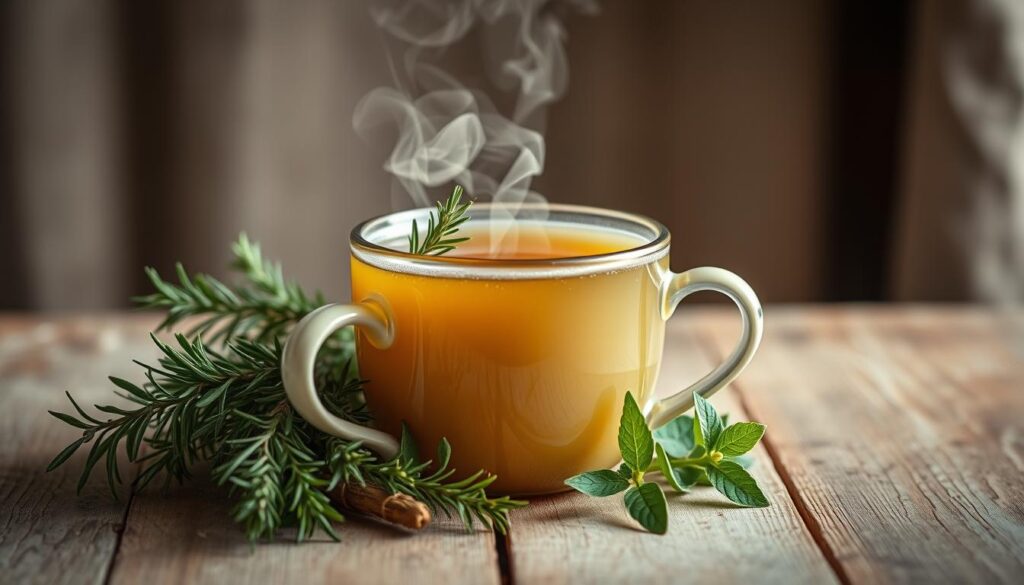
The table below shows some herbal tea ingredients commonly used for cold and flu relief along with their benefits:
| Herbal Ingredient | Key Benefits |
|---|---|
| Ginger | Boosts the immune system; soothes throat irritation |
| Echinacea | Supports immune function; may shorten cold duration |
| Chamomile | Promotes relaxation; helps with sleep disturbances |
| Peppermint | Reduces congestion; soothes digestive issues |
Adding these herbal teas to your daily habits can make you more comfortable when you have a cold or the flu. It’s important to stay hydrated and pay attention to what your body needs as you get better.
Incorporating Herbal Teas into Your Daily Routine
Adding herbal teas to your daily life is easy and rewarding. Start with one or two cups each day. You might want to replace your afternoon coffee with a herbal tea. This small step can make a big difference in how good you feel. It gives you a calm option and keeps you hydrated.
Try different flavors to see what you like best and what helps you feel good. You might like chamomile to relax or peppermint to help your stomach. Tea time can become a special moment in your day. It’s a chance to stop, think, and get energy back during your busy day.
Here are some tips to make herbal tea a part of your daily life:
- Find a time that fits your schedule, like morning, after lunch, or before bed.
- Have different kinds of herbal teas ready for whatever you’re in the mood for.
- Use a pretty teapot or mug to make drinking tea a fun experience.
- Enjoy your tea with a good book or some calm music to make it even better.
Potential Side Effects and Precautions
Herbal tea is great for your health, but some side effects come with it. Certain herbs might not react well with your body or any medicines you’re taking. For instance, hibiscus tea could cause issues for those on blood pressure meds. And if acid reflux bothers you, peppermint tea might make it worse.
Knowing the possible side effects helps you drink herbal tea without worries. If you have health issues or are expecting, talk to a doctor before trying new teas. Make sure the tea you pick fits your health objectives.
Learning about these precautions will make your herbal tea experience better. When in doubt about an ingredient, just ask a professional. This will keep you safe and let you enjoy exploring different herbal teas.
Crafting Your Own Herbal Tea Blends
Making your own herbal tea blends can be fun and fulfilling. You can experiment with different herbs to find what you like. Try mixing lavender with chamomile for a calming tea, or mint with ginger for a zesty taste.
The possibilities are endless when it comes to creating your own tea blends. This creativity lets you find exciting flavors and health benefits. For example, adding hibiscus can help your heart, while turmeric brings anti-inflammatory benefits.
Here’s an easy guide to help you start making your own herbal teas:
| Herb/Ingredient | Flavor Profile | Health Benefits |
|---|---|---|
| Chamomile | Floral, sweet | Promotes sleep and relaxation |
| Mint | Cool, refreshing | Aids digestion and freshens breath |
| Lavender | Floral, herbaceous | Reduces anxiety and improves mood |
| Ginger | Spicy, warm | Boosts immunity and alleviates nausea |
| Hibiscus | Tart, fruity | Lowers blood pressure and rich in antioxidants |
| Turmeric | Earthy, slightly bitter | Anti-inflammatory and antioxidant properties |
Pick the ingredients you like and start mixing. Making your own tea is about trying new things and having fun with it. You get to make drinks that not only taste good but also help you stay healthy. Your tea blends can become a special part of your day, boosting both health and happiness.
Conclusion: Embracing the Benefits of Herbal Teas
Herbal teas are packed with wellness benefits that easily fit into your day. Each cup is more than just a calming drink. It’s a powerful health booster. From helping in weight management to improving sleep, herbal tea has many impactful benefits. You enjoy these tasty drinks while feeding your body with good stuff.
Exploring different types of herbal tea opens up their health benefits. Whether it’s soothing chamomile or energizing peppermint, every tea has unique advantages. Adding herbal teas to your day adds natural plant goodness to your life.
Starting your herbal tea journey brings many health perks. Let these teas be a regular part of your day, improving hydration and life quality. By drinking more herbal tea, you’re making a great choice for better wellness.

